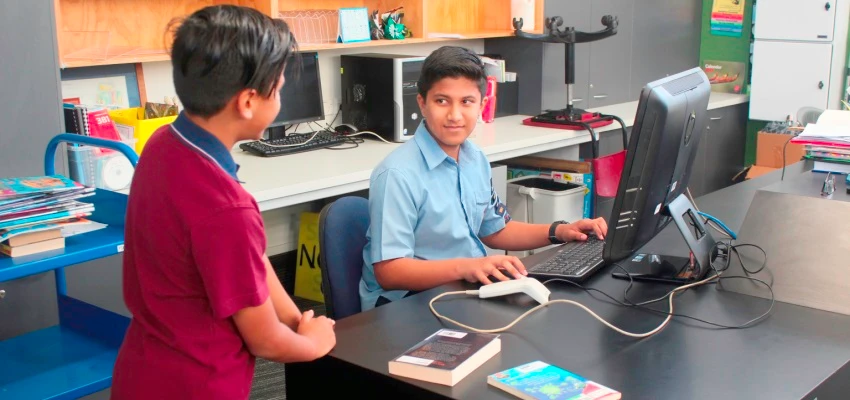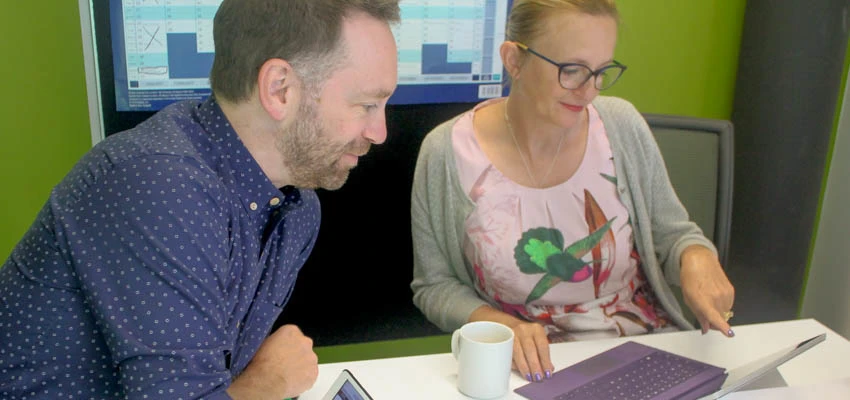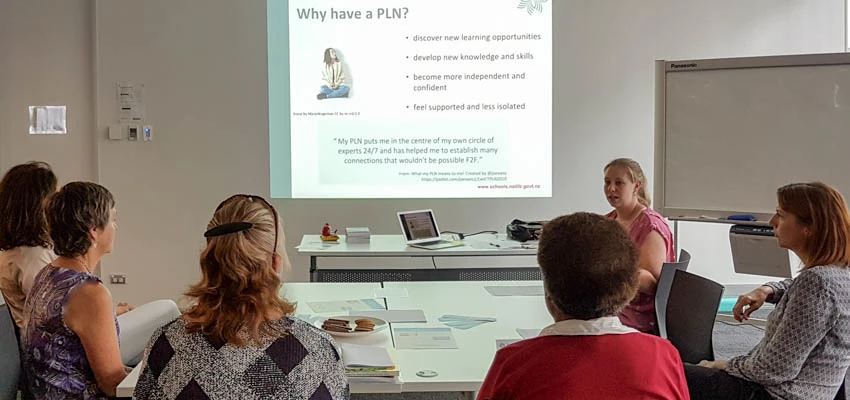School library roles and job descriptions

A great school library team has the right combination of professional expertise, skills and personal qualities to support teaching and learning. Find out about school library roles, employment agreements, job descriptions and pay grades.
Building an effective school library team
An effective school library offers services to support your school’s goals for student learning and wellbeing. The team must understand the school community's needs, and design and deliver library services to match.
Research into how libraries support student achievement has shown that enthusiastic and knowledgeable school library team members play a key role in helping students learn.
Find research about school library staffing
School library roles
The roles within your library team often depend on the number of students and year levels at your school.
Your school library team may comprise one of the following combinations of roles:
a teacher-librarian (TL), library manager or librarian, with sole responsibility
a library manager, librarian, or library assistant, and a teacher with library responsibility (TLR)
mix of staff who share library duties and responsibilities:
teachers
librarians
library assistants
resource managers
ICT specialists
other support staff.
In many schools, student librarians and adult volunteers make a valuable contribution to the day-to-day library work.
Teacher-librarian (TL)
Trained and employed as teachers, TLs may work full-time in the library or split their time between library and classroom teaching. TLs hold a Diploma of Teacher Librarianship or equivalent library qualification.
A TL role usually attracts a salary unit.
Salary units — primary teachers
Salary units — secondary teachers
The TL usually has responsibility for school-wide inquiry and reading engagement programmes. They also ensure a strong connection between the library and:
classroom programmes
curriculum
school community and wider library community.
Teacher with library responsibility (TLR)
A TLR usually has overall responsibility for managing the school library, alongside their primary role as a teacher. In some schools, the TLR acts more as a ‘critical friend’ or mentor for a library manager or librarian who has significant responsibility for the library.
A TLR role requires some release time and may attract a salary unit above the teacher's base salary.
The TLR acts as a liaison between the library and the rest of the school. They are responsible for ensuring there is a strong connection between the library and:
classroom programmes
curriculum
school community and wider library community.
Library manager or librarian
In the absence of a TL or TLR, the library manager or librarian usually takes on the responsibilities (as above) for managing the library. This includes support for inquiry and literacy programmes.
This role typically requires a professional library qualification.
Library assistant
Library assistants are responsible for day-to-day library tasks. They work under the direction of a TL, TLR, library manager or librarian.
Library assistants also liaise with teaching staff to support teaching and learning programmes.
Volunteers
Student librarians, parent helpers and community volunteers can help with day-to-day library tasks.
Student librarians can also:
contribute to library development
help raise the profile of the library with other students.
Employment agreements
The Ministry of Education, New Zealand Educational Institute (NZEI) Te Riu Roa and the New Zealand School Trustees Association (NZSTA) provide information and guides to help school leaders manage library staff employment.
Teacher-librarians and teachers with library responsibility are employed as teachers.
Support staff who work in the library are covered by:
the Support Staff in Schools' Collective Agreement (SSSCA) if they are members of New Zealand Educational Institute (NZEI) or E tū unions
an individual employment agreement (IEA) for non-union members.
Support Staff in Schools' Collective Agreement
Individual employment agreements — Ministry of Education provides an IEA template for support staff in schools.
Job descriptions
All school library employees need a written job description. It is part of their employment contract with the school and is a legal requirement under Section 65 of the Employment Relations Act.
Employment Relations Act 2000 — form and content of individual employment agreement
Job descriptions are usually prepared by the principal with input from relevant staff when a role is created. The principal and the new employee should sign and date the job description to say that they agree with its contents.
What goes in a job description
Job descriptions begin with a position title and a brief summary of the role.
A job description must include enough information for the staff member to understand:
what work they are expected to do, and any performance measures for that work
expectations about the levels of responsibility or decision-making they have.
These two aspects are key because together they determine the pay grade for the position.
A job description will also specify the following.
Hours of work and remuneration
Hours per week and weeks per year, or release time for TLs and TLRs
Pay grade or hourly rate
Reporting lines
The line manager for this role
Any roles reporting directly to this one
Other internal and external relationships
For example:
Heads of department
parents and whānau
National Library Services to Schools.
Skills, knowledge, experience, qualifications and personal qualities
Other background and qualities needed to do the job such as:
an interest in and up-to-date knowledge of books and other resources for children and young adults
experience using a range of strategies to engage young people with reading
working knowledge of library systems or platforms
a qualification in library and information studies
a willingness to keep up with changes in information technology, and library trends.
Creating a job description
Use these documents and guides to create job descriptions for your library staff.
Principals' kit — developing effective job descriptions for support staff — a step-by-step guide from NZEI.
Staff appointments — has a job description template for library team members employed as support staff (JD Support Staff). From NZSTA.
SSSCA: Section 3C.2 Work Matrix Table — has descriptions of the types of work, levels of responsibilities, skills and knowledge required for school library support staff roles. Also includes applicable pay grades. From Ministry of Education.
Librarians and Library Assistants' Pay Equity Claim Report — Appendix 2: General Areas of Responsibility — describes in more detail the range of responsibilities library team members may have. Also, the work they may be required to do. From Ministry of Education.
Keeping job descriptions up to date
Annual performance appraisals are a good time to review your library job descriptions.
Discuss, update and sign the job description when there are agreed changes to tasks, responsibilities, hours of work, grading or pay.
Job descriptions are living documents, and it means it's not a document that you just roll over without taking a look at it and considering whether or not the needs of the school, the requirements for the role have changed … you should be updating that job description in enough detail to help both parties understand what is expected in that employee's day-to-day work.
— Carla Palmer, NZSTA, Librarians and Library Assistants’, and Science Technicians (video at 29:25)
Our facilitators can help
Hopefully, the information on this page will be a helpful guide when you're developing or reviewing job descriptions. If you need further help, phone or email our Capability facilitators.
Freephone: 0800 LIB LINE 0800 542 5463
Related content

Student librarians
Read how to select, train, and manage your student librarians.
Performance appraisals
A performance appraisal is an opportunity for library staff to discuss their work and achievements. It focuses on how you're supporting teaching and learning, as well as how you're helping to develop successful and sustainable library services.
Leadership and expertise
Effective school library leadership and expertise creates an environment where the library is a vital part of the school community, with the resources needed to make a valuable contribution to student learning and well-being.